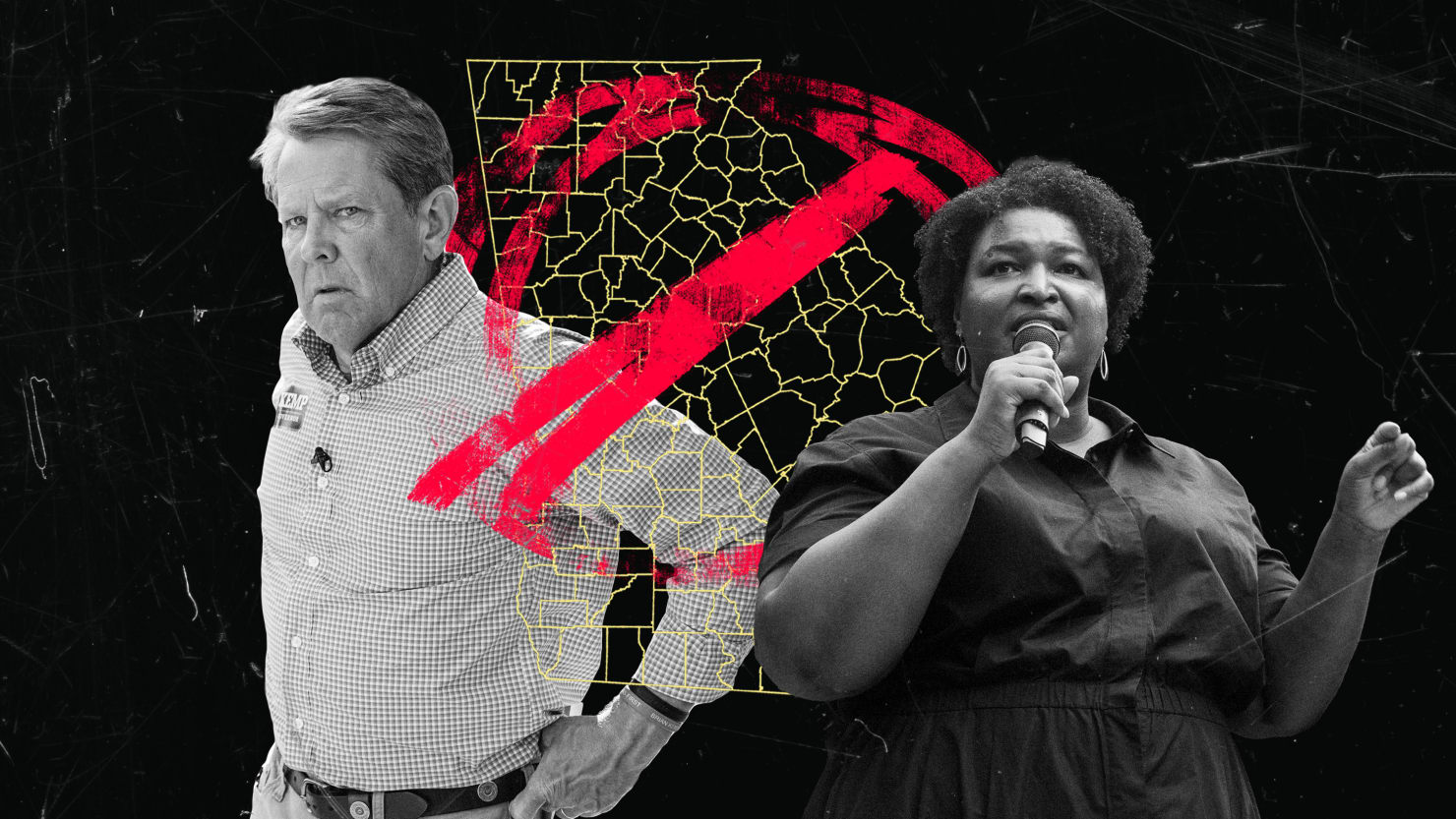Georgia’s Republican Gov. Brian Kemp says he has a problem with boycotts, particularly ones related to Georgia’s new voting restrictions law. But apparently that repulsion to boycotts only applies to Democrats and issues he favors, because Kemp has personally proposed boycotts of his own.
Kemp and his campaign have recently reupped false attacks on Democratic rival Stacey Abrams, accusing her, erroneously, of promoting a 2021 Major League Baseball boycott in Georgia as a means to pressure conservatives into repealing the new voting law Georgia passed in April 2021.
While Abrams did not encourage that boycott—and, in fact, publicly discouraged it—Kemp himself personally called on Georgians to boycott companies when it suited his political agenda, and asked state legislators to take punitive economic action against Georgia-based Delta Airlines over ideological differences.
“Last year, Stacey Abrams pressured MLB to move the All-Star game out of Georgia,” Kemp tweeted in July. “After costing Georgia businesses $100 MILLION in lost revenue, imagine the damage Abrams would cause to our economy if she’s elected Governor.”
Last week, Kemp’s press secretary, Tate Mitchell, tweeted that “Abrams actively encouraged businesses to boycott Georgia and flip-flopped when she was caught lying about it,” and contrasted that claim with Kemp’s economic record.
The Kemp team even built a campaign ad around the false claim, alleging that Abrams and the MLB “stole” the All-Star Game from Georgia. .
But in 2018, as Kemp campaigned for governor, he encouraged citizens to boycott major companies who came out against the firearms industry in the wake of the Parkland massacre. Kemp framed the move as an expression of age-old conservative “free market” values.
In an interview with AmmoLand about a month after the shooting, Kemp was asked how gun owners can “fight back” against corporations “from Wal-Mart to Citibank” who were “trying to impose their beliefs on us.”
“I believe in free markets. If businesses target Second Amendment supporters, we, as private citizens, should express our objection with our wallet,” Kemp replied.
The previous month—about two weeks after Parkland—Kemp asked state lawmakers to use economic cudgels to punish Georgia-based Delta Airlines after the company’s “ill-advised decision” to end its relationship with the National Rifle Association.
In a press release still posted on his campaign website, Kemp called Delta a “corporate coward,” and said its move against the NRA had “jeopardized” a tax break slated to “save the airline millions of dollars.”
Kemp, at the time Georgia’s secretary of state, had opposed the tax break, and used the ideological controversy to demand that state lawmakers “replace it with a sales tax holiday that benefits the same 2nd Amendment supporters that Delta—and other corporate cowards—are publicly shaming.”
“If state lawmakers are unwilling to put hardworking Georgians first this session, I’ll do it in 2019 as the Peach State’s next governor,” Kemp vowed.
Those two moves would appear to undercut Kemp’s ongoing attacks against Abrams. However, the attacks are baseless to begin with: Abrams did not, as the Kemp camp says, encourage the boycott that led MLB to pull the All-Star game out of Atlanta that year.
When that claim resurfaced this year, PolitiFact rated it “False,” citing Abrams’ own words—an issue the site had also addressed after Kemp’s attacks at the time. As it turns out, the state’s most influential Democrat had actually taken the opposite position, asking supporters to “not boycott” Georgia.
In a video posted to Twitter in March 2021, Abrams said she understood “the passion” behind the nationwide calls for boycotts in response to controversial voting restrictions that Kemp had signed.
“But here’s the thing: Black, Latino, AAPI (Asian American-Pacific Islander) and Native American voters whose votes are the most suppressed under SB 202 are also the most likely to be hurt by potential boycotts of Georgia,” Abrams said. “To our friends across the country please do not boycott us. To my fellow Georgians, stay and fight, stay and vote.”
Kemp’s tweet last month that Abrams had “pressured” the MLB to withdraw the All-Star game cited a Fox News report from April 2021, which ran with the headline: “MLB commissioner decided to move All-Star Game after pressure from Stacey Abrams on voting issues: sources.”
However, those anonymous sources did not say that Abrams had pressured the league to move the game, but had asked the commissioner to forcefully denounce the new voting law. In those meetings, Abrams had encouraged the MLB not to pull the game out of Georgia, as Atlanta Journal-Constitution reporter Greg Bluestein later reported, and the league confirmed to PolitiFact.
In response to The Daily Beast’s questions, Kemp press secretary Tate Mitchell—who went after Abrams in the boycott issue last week—claimed speciously that Abrams had edited her own USA Today op-ed, and asserted that Kemp “has never supported a boycott of our state.
“While Stacey Abrams may be the first candidate in history to edit her own op-ed after she was called out for supporting reckless boycotts of our state, she can’t run from her woke record,” Mitchell said—a reference to an update Abrams had not made voluntarily, but at the request of USA Today. “Governor Kemp has never supported a boycott of our state, and under his leadership, good-paying jobs and new investment are breaking records in the Peach State. The Governor also took swift action to help Georgians fight through 40-year high inflation caused by failed liberal policies and will continue to fight the disastrous Biden-Abrams agenda.”
The op-ed dispute concerns revisions Abrams made after MLB moved the All Star game to Denver—revisions added at the request of USA Today. But while Abrams used the opportunity to slam Republicans and former President Donald Trump (who had floated the idea of canceling the sport as the national pastime), she didn’t change her fundamental stance on the issue.
“Instead of a boycott, I strongly urge other events and productions to do business in Georgia and speak out against our law and similar proposals in other states,” she wrote.

